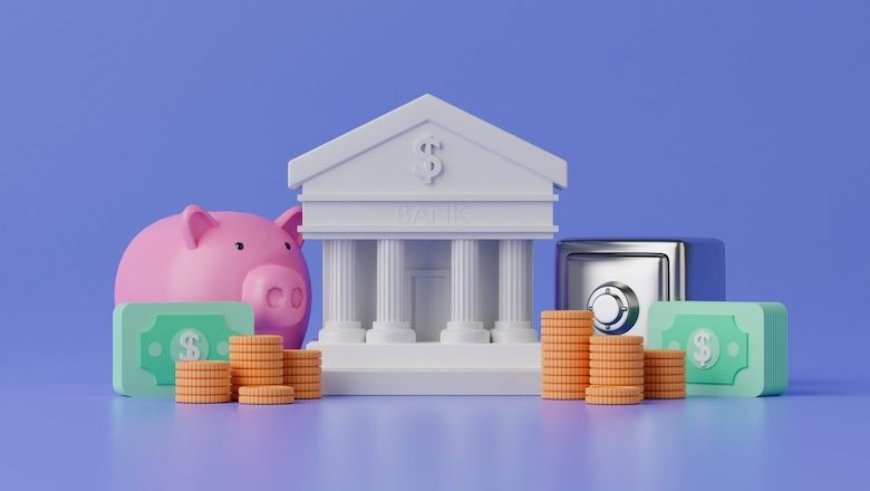5 Ways to Enhance Your Banking Knowledge and Savings Strategy
Level Up Your Financial Literacy and Boost Your Savings Balance with These Simple Actions

To become more financially savvy and make the most of your banking accounts, you don't need a degree in finance or a big investment. With these five easy steps, you can improve your banking knowledge, enhance your savings strategy, and grow your balance in no time. From managing account anxiety to earning higher yields and avoiding fees, here's how to take control of your finances and achieve your financial goals.
Confront Your Account Anxiety
If you're like most people, the thought of checking your bank balance can be daunting. However, ignoring your accounts won't make them go away or help you reach your financial goals. Instead, try to face your account anxiety head-on by reviewing your statements regularly. This will give you a better understanding of your spending patterns, highlight areas where you can cut back, and help you identify opportunities to save more.
Prioritize Saving Consistency
Saving money consistently can be more effective than trying to save a large sum at once. Set up automatic deposits to your savings account or allocate a portion of your income for savings each month. Even small contributions can add up over time and create a solid emergency fund or financial cushion for unexpected expenses.
Optimize Your Account Yields
Choosing a high-yield savings account or checking account with good interest rates can help you grow your balance more quickly. Although many traditional banks offer low interest rates, online banks and credit unions may have higher yields, so do your research and compare your options. Remember, every dollar counts, and even a small difference in interest rates can make a big impact on your savings over time.
Eliminate Bank Fees
Bank fees can eat into your savings and drain your account balance quickly. Look for checking and savings accounts that offer low or no maintenance fees or transaction fees. Some banks may require you to meet specific requirements, such as maintaining a minimum balance or setting up direct deposit, to avoid fees, so read the fine print before opening an account.
Know Your Federal Insurance Options
If you're concerned about the safety and security of online banking or depositing your money with a new institution, knowing your federal insurance options can provide peace of mind. The FDIC and NCUA offer federal insurance to protect your deposits in case of bank failure or closure, up to a certain amount. Before opening a new account, check the institution's policies and ensure your funds are federally insured to safeguard your savings.
By following these simple steps, you can level up your financial literacy, enhance your banking knowledge, and boost your savings balance. Remember, every little action counts, so start small and watch your savings grow over time.
Consider a CD ladder
If you have a lump sum of money you want to save, a certificate of deposit (CD) might be a good option. CDs typically offer higher interest rates than savings accounts, but they require you to leave your money untouched for a set period of time.
One way to maximize your CD earnings is to use a CD ladder strategy. This involves dividing your lump sum into equal parts and investing them in CDs with different maturity dates. For example, you might invest $2,000 in a six-month CD, another $2,000 in a one-year CD, and so on. As each CD matures, you can reinvest the funds into a new CD with a longer maturity date, allowing you to take advantage of higher interest rates while still having access to some of your funds every few months.
Automate your finances
Automating your finances can help you save money without even thinking about it. You can set up automatic transfers from your checking account to your savings account, or set up automatic bill payments to avoid late fees.
Many banks also offer tools that can help you save automatically. For example, Bank of America's Keep the Change program rounds up your debit card purchases to the nearest dollar and transfers the difference into your savings account.
Be mindful of credit card debt
Credit cards can be a useful tool for building credit and earning rewards, but they can also be a source of debt if you're not careful. High interest rates and fees can quickly add up, making it difficult to pay off your balance.
To avoid credit card debt, it's important to be mindful of your spending and to pay your balance in full each month. If you're struggling to pay off your balance, consider a balance transfer to a card with a lower interest rate, or look into a personal loan to consolidate your debt.
Shop around for banking products
Not all banking products are created equal. Before choosing a bank or credit union, take the time to shop around and compare products and fees.
Look for accounts with no monthly maintenance fees, low minimum balance requirements, and high interest rates. Consider online banks, which often offer higher yields and lower fees than traditional brick-and-mortar banks.
Don't forget to also compare credit cards, loans, and other financial products to ensure you're getting the best deal.
Educate yourself
Finally, one of the best ways to level up your banking smarts is to educate yourself. Read personal finance books, follow financial blogs, and take advantage of free resources from your bank or credit union.
By learning about different banking products and strategies, you can make informed decisions about your money and take steps to grow your wealth over time.
































































